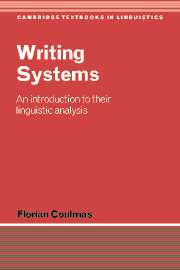Book contents
- Frontmatter
- Contents
- List of illustrations
- List of tables
- Acknowledgements
- A note on fonts
- List of abbreviations and conventions
- 1 What is writing?
- 2 The basic options: meaning and sound
- 3 Signs of words
- 4 Signs of syllables
- 5 Signs of segments
- 6 Consonants and vowels
- 7 Vowel incorporation
- 8 Analysis and interpretation
- 9 Mixed systems
- 10 History of writing
- 11 Psycholinguistics of writing
- 12 Sociolinguistics of writing
- Appendix: Universal Declaration of Human Rights, article 1
- Bibliography
- Index of names
- Index of subjects
12 - Sociolinguistics of writing
Published online by Cambridge University Press: 05 June 2012
- Frontmatter
- Contents
- List of illustrations
- List of tables
- Acknowledgements
- A note on fonts
- List of abbreviations and conventions
- 1 What is writing?
- 2 The basic options: meaning and sound
- 3 Signs of words
- 4 Signs of syllables
- 5 Signs of segments
- 6 Consonants and vowels
- 7 Vowel incorporation
- 8 Analysis and interpretation
- 9 Mixed systems
- 10 History of writing
- 11 Psycholinguistics of writing
- 12 Sociolinguistics of writing
- Appendix: Universal Declaration of Human Rights, article 1
- Bibliography
- Index of names
- Index of subjects
Summary
For a long time, writing was a secret tool. The possession of writing meant distinction, domination, and controlled communication, in short, the means of an initiation. Historically writing was linked with the division of social classes and their struggles, and (in our country) with the attainment of democracy.
Roland BarthesLiterate societies are characterized by a literate environment which promotes extensive and regular use of literacy in all communicative domains. In such societies, illiteracy is considered to be a stigma by both the literate and the nonliterate sections of the society.
Chander DaswaniIlliteracy, says the Indian linguist and educationalist Chander Daswani, is a stigma. This is not the whole story, but it says a lot about writing and society, indeed, about literate society. If it is appropriate to speak of written language and the literate mind, it is certainly no less so to speak of the literate society. We are living in a literate society, which is to say in a modern society. For universal literacy is a recent accomplishment brought about by general education. As late as a century ago, large sections of the most advanced countries could not read or write. In former times, literacy used to be a specialized skill mastered only by a small elite of professionals. Writing was always associated with power and social distinction, as the French philosopher and media theoretician Roland Barthes pointed out.
- Type
- Chapter
- Information
- Writing SystemsAn Introduction to Their Linguistic Analysis, pp. 223 - 241Publisher: Cambridge University PressPrint publication year: 2002
- 1
- Cited by



